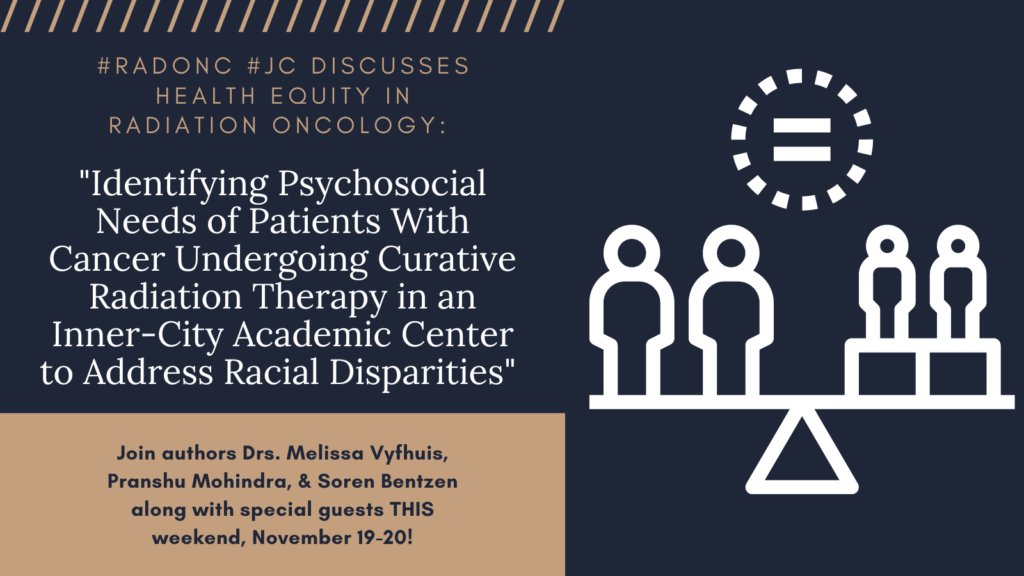Looking Ahead – Addressing Health Disparities through Collaborative Action
by Ian Pereira, Sara Beltran Ponce, Amy Le, & Niema Razavian
This quarter, the #RadOnc #JC will discuss health equity, guided by a recently published study:
Almost twenty years since the cost of unequal treatment1 in health care was described along with benefits of specific interventions, we are not much closer to achieving health for all. Despite tremendous advances in cancer care, including improvements in radiation treatments that benefit over 50% of all patients with cancer, socioeconomic disparities are widening. This is expected to continue through conflicts based on racial and ethnic stressors, our changing climate, and ignored opposition to health equity research and implementation of interventions.

In keeping with rapidly evolving quality standards for health equity research, the Kronfli et al study2 describes the first prospective initiative in radiation oncology to identify psychosocial needs of patients along with development of a measurement tool, the ‘Unmet Needs Index’. They specifically addressed race, encouraged the patient voice through Patient Reported Outcomes (PROs), and provided the opportunity for patients to discuss unmet needs with a social worker. Their results suggested specific unmet needs disproportionately in Black patients, and the authors concluded by calling on radiation treatment centers to prioritize antiracist policies and practices.
This weekend on Twitter the #RadOnc #JC will be joined by the authors Drs. Melissa Vyfhuis (@dr_dominicana), Pranshu Mohindra (@PranshuMohindra), Soren Bentzen (@SorenBentzen) and special guests. We will discuss this work in context along with its implications, not only for more research, but also on the importance of moving to tangible interventions to realize health equity in radiation oncology and beyond.
Our guiding topics:
T1. Background: What is health equity & why is it important to cancer care? What was the study’s rationale?
T2. Methods: How was the study designed & why? What is its ‘Unmet Needs Index’?
T3. Results/Discussion: What were the results & why is this important? How does the study relate to your local practice/experience?
T4. #PatientsIncluded: What health equity issues are important for patients undergoing radiation treatment?
T5. Conclusions/Next Steps: Will this change your practice? What additional research is needed? What interventions can be used to achieve health equity in radiation oncology?
To join us, tune in on Twitter:
#RadOnc #JC
Saturday, November 19th 8AM CST to Sunday, November 20th 2pm CST.
Live Hour from 1-2pm CST on Sunday
Tips to participate:
- Guidelines on how to sign up & participate
- Disclaimer for ways to keep #RadOnc #JC rewarding and professional. If you’re not ready, just lurk & tune in to the conversation.
References:
- Institute of Medicine Committee on U, Eliminating R and Ethnic Disparities in Health C. In: Smedley BD, Stith AY and Nelson AR (eds) Unequal Treatment: Confronting Racial and Ethnic Disparities in Health Care. Washington (DC): National Academies Press (US). 2003
- Kronfli D, Savla B, Lievers A, et al. Identifying Psychosocial Needs of Patients With Cancer Undergoing Curative Radiation Therapy in an Inner-City Academic Center to Address Racial Disparities. Int J Radiat Oncol Biol Phys 2022; 114: 185-194. 2022/05/02. DOI: 10.1016/j.ijrobp.2022.04.003.